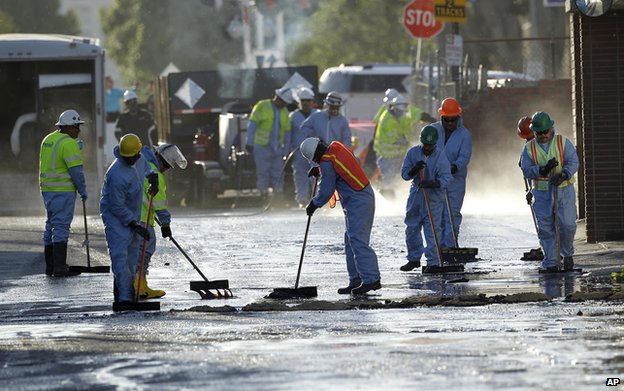
Caution: Toxic Tax Exempt Oil Train Crossing Ahead
A Plains All American pipeline spilled 10,000 gallons of oil in Los Angeles. The company is heavily subsidize and a major crude by rail company.

Responders attempt to clean oil from the streets of Los Angeles (image source: AP)
Last Thursday, Plains All American’s “Line 2000” pipeline that runs through California ruptured, spraying oil 20 feet in the air and spilling an estimated 10,000 gallons of oil into the street of a Los Angeles neighborhood and creating knee-deep pools of crude oil up to 40-feet wide.
The 20-inch break occurred at a nearby pump station on the pipeline’s 130-mile route between the central California oil fields in the San Joaquin Valley and refineries in Long Beach, including those owned by Phillips 66, Valero, and Tesoro.
Those are the bare facts of this latest oil industry incident. But a closer examination reveals Plains All American’s callous attitude towards safety that is enabled by taxpayer dollars, and expanding to more and more communities around the U.S.
Public Health Risks, Corporate Indifference
Four people nearby were sickened by the fumes and two were taken to the hospital. The Los Angeles County Health Department issued an extreme odor advisory urging children, the elderly, and people with chronic disease to limit their time outdoors. Nevertheless, Plains All American displayed little concern for the public health impacts of their careless operations, insisting that the oil fumes pose “no danger to responders or neighbors”.
The company’s blasé attitude towards the safety of its operations was also evident in the apparent lack of a coherent response strategy for the L.A. spill, as demonstrated by the haphazard clean-up operations. Fortunately, firefighters were able to block the oil from spilling into storm drains by constructing a barrier of sand procured from a nearby cement store. After the street was vacuumed, diapers were used to absorb the remaining oil.
It is a stroke of luck that the oil was kept from spilling into storm drains. A spokeswoman for the California Department of Fish and Wildlife’s Office of Spill Prevention and Response said that if the oil had gotten into the drains it would have spread rapidly, harming wildlife and the water system.
Huge Subsidies for Plains All American
Like a large share of other midstream oil and gas companies, Plains All American is a Master Limited Partnership (MLP) company, an “income and a tax shelter rolled into one” that allows companies to avoid paying the 35 percent federal corporate income tax. The oil and gas sector increasingly dominates this special status, making up more than three-quarters of total MLP market capitalization in 2012. Thanks to this tax break, fossil fuel companies receive up to $4 billion per year in subsidies.
In 2013, Plains All American reported $1.49 billion in pretax income. As an MLP, Plains All American’s exemption from the federal corporate income tax resulted in a subsidy of between a low estimate of $86 million to over $300 million last year, depending on the methodology used (see OCI’s report on MLPs for more detail). Plains’ enormous federal subsidies and even larger corporate profit make it completely unacceptable that the company is cutting corners when it comes to public safety, putting communities across the country at risk of accidents from its sprawling oil infrastructure.
Expanding into Crude by Rail
In addition to being a major oil pipeline company, Plains All American is one of the biggest players in the (literally) booming expansion of crude by rail. Plains All American owns more crude by rail terminal capacity than any other company – it currently operates eight terminals with 579,000 barrels per day, with plans to build an additional terminal and expand capacity to 749,000 barrels per day by 2015 (see OCI’s forthcoming report “Runaway Train” for more detail).
The expansion of Plains All American, a major oil pipeline company since the early 1990s, into the burgeoning crude by rail business starting in 2011 is proof that the transport of oil across North America is no longer a choice between pipeline and rail – both will play a major role into the foreseeable future. Plains’ crude by rail operations profit from some of the dirtiest fossil fuels, with terminals to load fracked tight oil in North Dakota, Colorado, and Texas, as well as a terminal planned in Alberta for transporting Canadian tar sands.
Crude by rail has a disastrous safety record in North America. The number of oil spills from rail transport increased by 10 times in the U.S. between 2008 and 2013. Several of these accidents resulted in tens to hundreds of thousands of gallons of spilled crude oil, including the April 30 train derailment in Lynchburg, Virginia that spilled oil into the James River. In the most tragic incident to date, 47 people were killed when a train carrying volatile oil from North Dakota’s Bakken shale derailed and exploded in Lac Mégantic, Quebec.
With this latest pipeline spill in L.A. under its belt, Plains All American will fit right in as a leader in the accident-ridden crude by rail industry. We urgently need strict and rigorously enforced regulations to put a stop to the proliferation of pipeline and rail accidents, the dangerous result of an out of control All of the Above U.S. energy strategy.
